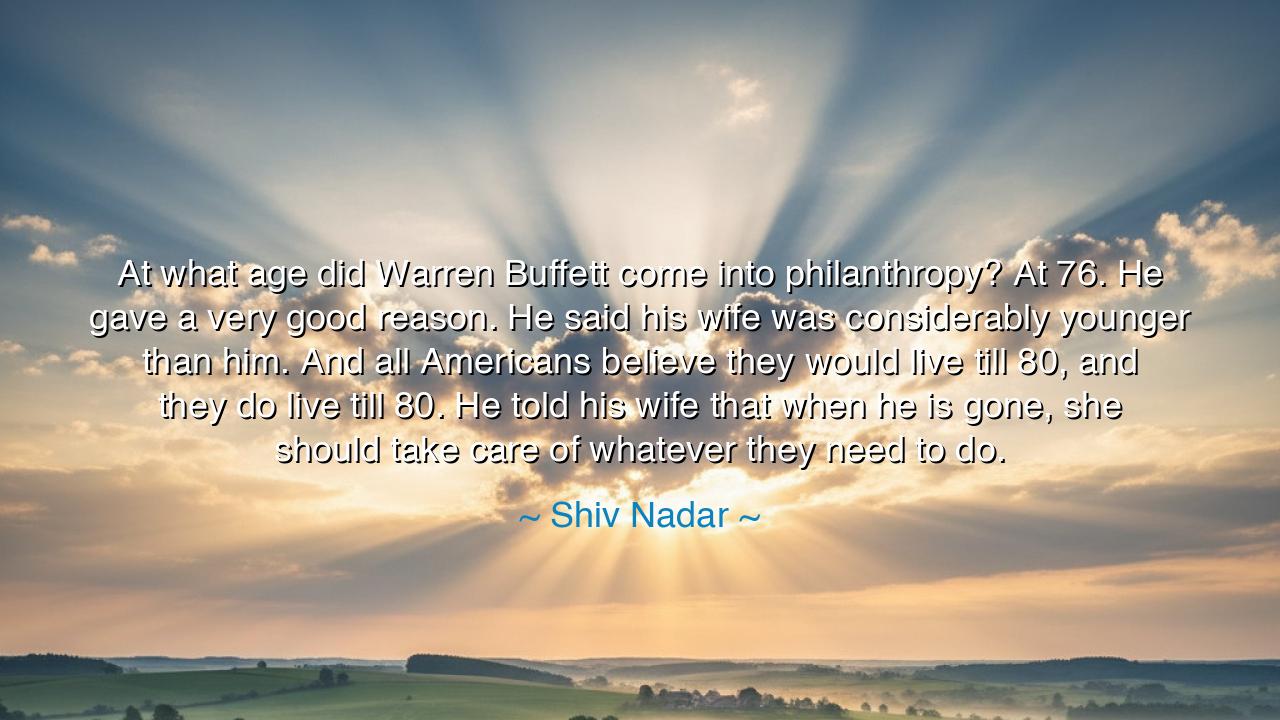
At what age did Warren Buffett come into philanthropy? At 76. He
At what age did Warren Buffett come into philanthropy? At 76. He gave a very good reason. He said his wife was considerably younger than him. And all Americans believe they would live till 80, and they do live till 80. He told his wife that when he is gone, she should take care of whatever they need to do.






When Shiv Nadar said, “At what age did Warren Buffett come into philanthropy? At 76. He gave a very good reason. He said his wife was considerably younger than him. And all Americans believe they would live till 80, and they do live till 80. He told his wife that when he is gone, she should take care of whatever they need to do,” he was not merely recounting a tale of a rich man’s generosity. He was unveiling a deeper truth about time, purpose, and the awakening of conscience. In this reflection, philanthropy is not presented as a luxury of wealth, but as a sacred duty that ripens with age — an act born not of abundance, but of wisdom. It reminds us that giving is not only about money; it is about understanding one’s place in the great cycle of life.
The heart of this quote lies in the timing of generosity. Warren Buffett, a man of legendary discipline and intelligence, did not begin his great acts of giving in the first bloom of success, but in the twilight of his years. At seventy-six, when many consider life’s work complete, he turned his gaze toward legacy. Nadar’s retelling of this moment is not to glorify delay, but to show that even in the last chapters of life, one can find renewal through selflessness. It is a reminder that true philanthropy is not measured by how much one gives, but by the clarity of purpose behind the giving — the understanding that wealth, if hoarded, decays, but if shared, multiplies in meaning.
In Buffett’s reasoning, we find a profound humility. He speaks not of control, but of trust — entrusting his wife to carry on their shared duty of giving after his passing. This act of faith and foresight echoes the ancient wisdom of stewardship: that wealth is never truly owned, only held for a time, to be returned to the world from which it came. Buffett’s acknowledgment that life is finite — that eighty years is the common boundary of man — is both practical and poetic. It is the acceptance that time, not gold, is the greatest measure of worth.
The origin of Nadar’s quote lies in his reflections on wealth and responsibility, drawn from his own journey as a builder, innovator, and philanthropist. As one of India’s foremost visionaries, Nadar admired in Buffett the union of intellect and ethics — the belief that success is incomplete until it uplifts others. His retelling carries the tone of reverence, for he too saw philanthropy as the natural culmination of achievement. Just as Buffett turned his empire into a vessel for good, Nadar himself built institutions of education and progress, guided by the same truth: that to give back is to honor life itself.
History is filled with souls who discovered this wisdom late, yet changed the world through it. Consider Andrew Carnegie, the steel magnate who spent the first half of his life amassing wealth and the second half dispersing it. When asked why he gave so much, he replied, “The man who dies rich, dies disgraced.” In that spirit, Buffett’s late entry into philanthropy does not diminish his virtue — it deepens it. For he gave not from guilt or impulse, but from understanding. He gave after learning what wealth truly means: not ownership, but opportunity.
Nadar’s story also carries a quieter lesson about partnership and legacy. Buffett’s decision to entrust his wife with their shared mission is a reflection of love intertwined with purpose. It teaches that giving is not a solitary act but a generational covenant — a bridge between hearts, and between ages. Just as dynasties once passed down swords and thrones, the wise now pass down compassion. Through philanthropy, the elders bequeath to the young not possessions, but principles: the understanding that greatness is measured by service, not accumulation.
So let this teaching endure: Wealth without purpose is like a tree that bears no fruit. Whether you are rich in gold, in knowledge, or in kindness, life will one day demand that you share its gifts. Begin when you can, but never believe it is too late to begin. Like Warren Buffett, you may find that the true work of your life begins not in ambition, but in generosity. And like Shiv Nadar, you may learn that the legacy worth leaving is not carved in stone, but written in the better lives of others.
For when a man learns to give — be it at thirteen, or seventy-six — he discovers the timeless secret of the soul: that the hands which open to give never grow empty, and that in giving, one finally becomes free.






AAdministratorAdministrator
Welcome, honored guests. Please leave a comment, we will respond soon